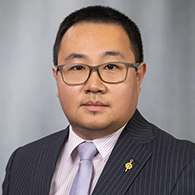K-State engineer leading study on point-of-care additive manufacturing
Thursday, Nov. 14, 2024
MANHATTAN — A Kansas State University engineer is conducting a study aimed at assessing and increasing the technical knowledge and professional skills of engineering students in the emerging field of point-of-care additive manufacturing.
Meng Zhang, Steve Hsu keystone research scholar and associate professor of industrial and manufacturing systems engineering, received a more-than-$300,000 grant from the National Science Foundation’s Division of Undergraduate Education to lead an interdisciplinary team of engineering, sociology, medical and biomaterial professors working to provide training and mentoring to engineering students who may be interested in additive manufacturing for the health care field.
Point-of-care additive manufacturing is a nontraditional form of manufacturing that uses a 3D model to create a physical object based on medical imaging data at the place of patient care.
"This process refers to the just-in-time creation of anatomical models, surgical instruments, prosthetics, scaffolds and other additive manufactured applications," Zhang said. "Despite the exponential growth in point-of-care additive manufacturing market value and scholarly activities, the needed education and training components have not been developed, especially for undergraduate students."
Xiuzhi "Susan" Sun, K-State professor emeritus and now at the Wake Forest Institute for Regenerative Medicine, Weilong Cong and Patricia Maloney, associate professors at Texas Tech University, and Ebtesam Islam, a pulmonologist and associate professor at Texas Tech University Health Sciences Center, are among those working alongside Zhang on the three-year project.
"We will partner with health care experts and practitioners to conduct research and provide training and mentoring to develop holistic and well-rounded engineering students for the point-of-care additive manufacturing field," Zhang said. "Additionally, this project will remove barriers between research in this field and higher education while interconnecting key concepts in multiple sub-disciplines of point-of-care additive manufacturing. It will also expose this exciting field and unique skillset to many undergraduate students at two flagship universities."

